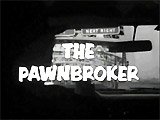
|
The Pawnbroker (1964)
In director Sidney Lumet's mainstream, documentary-styled,
b/w, socially-conscious psychological urban melodrama (shot on location)
with a number of quick flashbacks and montages to reveal the protagonist's
horrific remembered past as a concentration camp survivor; it was
the first US film to show a woman nude from the waist up with bare
breasts that was granted a Production Code seal because the nakedness
was integral to the story, and the film was enhanced with a jazzy
Quincy Jones score:
- the opening prologue was a slow-motion, nostalgic,
and idyllic mid-summer memory of a young, happy Jewish man (a university
professor) with his wife, his children and older relatives in an
open country meadow, when suddenly the images were jarred or interrupted
by an unknown menace (the arrival of German Nazi officials in a
car)
- twenty years after the war (and after his wife's
death), Nazi concentration camp sole survivor and
emotionally withdrawn, embittered pawnbroker Sol Nazerman (Best
Actor-nominated Rod Steiger) worked in a grimy, claustrophobic
Spanish and East Harlem pawnshop (at 116th St. and Park Ave.),
and supportively lived with his sister-in-law Bertha (Nancy R.
Pollack) in a suburban home on Long Island, with her two squabbling
teenaged children; he had a distant relationship with Tessie
(Marketa Kimbrell) (another camp survivor) with whom he slept and
played cards, and he supported both Tessie and her father-in-law
Mendel (Baruch Lumet); Sol also suffered through a cold acquaintanceship
with friendly, middle-aged spinster social welfare worker Marilyn
Birchfield (Geraldine Fitzgerald)
- Sol responded
to his brash, ambitious young shop assistant Puerto Rican Jesus Ortiz
(Jaime Sanchez), a reformed criminal, who was interested in
a friendship and mentoring relationship with the closed-off Sol;
Jesus asked about Jewish business success: "So
how come you people come to business so natural" - Nazerman
answered (in part): "You people? Oh, I see. Yeah. I see. I see,
you, uh, you want to learn the secret of our success, is that right?
All right, I teach you. First of all, you start off with a period
of several thousand years, during which you have nothing to sustain
you but a great bearded legend. Oh my friend, you have, uh, no land
to call your own, to grow food on or to hunt. You have nothing. You're
never in one place long enough to have a geography or an army or
a land myth. All you have is a little brain. A little brain and a
great bearded legend to sustain you and convince you that you are
special, even in poverty. But this, uh, this little brain, that's
the real key, you see. With this little brain, you go out and you
buy a piece of cloth, and you cut that cloth in two and you go out
and sell it for a penny more than you paid for it. Then you run right
out and buy another piece of cloth, cut it into three pieces and
sell it for three pennies profit....You just go on and on and on
repeating this process over the centuries, over and over, and suddenly
you make a grand discovery. You have a mercantile heritage! You are
a merchant. You are known as a usurer, a man with secret resources,
a witch, a pawnbroker, a sheenie, a makie and a kike!"
|
Sol's Answer to Question by Jesus Ortiz about Jewish
Business Success
|

|
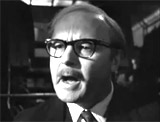
|
- quick-cutting flashbacks represented two of Sol
Nazerman's memory flashes: (1) after he glanced at a pregnant young
female customer's glittering diamond engagement ring, he recalled
outstretched hands next to barbed wire having jewelry removed from
fingers by the SS Nazis, and (2) a barking dog and rumble in
the slum against a black youth triggered his recollection of an
attempted concentration camp escape by a Jewish prisoner struggling
to climb over a wire fence before being attacked by a Nazi German
shepherd
|
Disturbing and Associative Flashcuts Back to Concentration
Camp Horrors
|

|
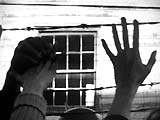
|
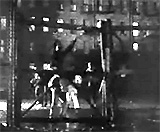
In the Present
|

In the Death Camp
|
- Sol became very concerned and suffered a crisis of
conscience when he learned that his silent black business partner-backer
Rodriguez (Brock Peters), a local crime boss, was using the unprofitable
pawnshop as an illegal front to launder money for his rackets - and
brothel businesses; the fact that the pawnshop was being used to
promote prostitution was a trigger to recall memories of
his dead wife's rape in the concentration camp; after Sol told Rodriguez
that he refused to accept money from a brothel, he was beaten into
submission to comply
- in the film's most controversial
scene, a black prostitute (Thelma Oliver), Jesus' girlfriend who
was employed by Rodriguez, bared her breasts for Sol in exchange for money: ("You've
got to get me some money - Look!"); a fast series of clips alternated
between shots of the prostitute, himself, and his brutal, intense
and triggered flashbacks of Nazi guards readying themselves to sexually
assault his humiliated wife Ruth (Linda Geiser) (also seen briefly
topless) years before
- because Sol interpreted sex as dark and evil,
he covered the young topless woman with her raincoat, and gave her
a $20 dollar bill; after learning about Jesus' and the hooker's connections
to Rodriguez, Sol cruelly denounced the young boy (and any association with him) and told
him: "You are nothing to me"
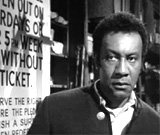
Robbery of Pawn Shop: Tangee with Other Thugs
|
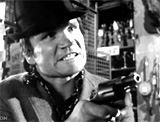
Robbery Attempt with Firearm
|

Ortiz' Death on the Sidewalk
|
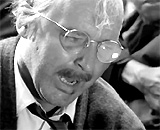
Sol's Reaction
|
- Jesus became involved with old criminal neighborhood
buddies in a plot to rob the shop; he was prompted to turn spiteful
against his mentoring teacher Sol, after Sol's cruel comment, but Jesus
insisted to his accomplices that no guns would be used during the
robbery
- however, in the depressing and tragic conclusion,
an armed robbery was led by a neighborhood gang leader Tangee (Raymond
St. Jacques) and two thugs - the theft was connected and visualized
as the ominous arrival of the three German officials in the film's
opening; the thugs mercilessly beat up Sol when he refused to cooperate
and turn over money to them
- during the assault, Jesus stepped in to
try and save Sol when a gun was aimed at him, and he was accidentally
hit by the gunshot - Jesus crawled out to the sidewalk and died
in the street, after confessing: "I
said no shootin'. No to hurt you"; Sol realized that Jesus
had sacrificed his life for him - and attempted to scream with
his mouth grimacing and wide open, but with no sound emerging
- shockingly and cathartically, Sol's skewered and
punctured his hand on a sharp metal receipt spindle in the shop
used to hold pawn tickets or receipts - the self-inflicted wound
was intended to force him to feel the physical pain and restore
his humanity
|
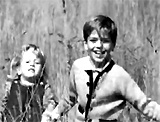
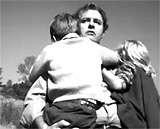
Prologue - a Mid-Summer Memory


Black Prostitute (Thelma Oliver)
The Triggering Sol's Flashback of His Wife's Rape in Camp



Sol's Wife Ruth Nazerman (Linda Geiser) - Abused in Death
Camp |








